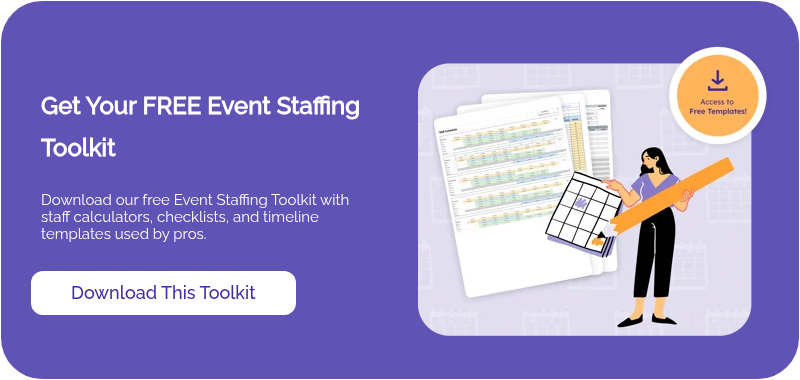Managing event staff effectively is crucial for the success of any event.
While virtual events may have become more common post-pandemic, 87% of meetings and events are now conducted in person due to virtual fatigue which means the role of on-site staff remains pivotal.
Whether you’re planning a corporate conference, a large festival, or an intimate wedding, your event team usually includes bartenders, servers, brand ambassadors, technicians and security guards who all shape the guest experience. For events that rely on door, stage or VIP protection, dedicated security staff scheduling software helps you assign the right guards to the right posts and avoid last-minute coverage gaps. When every role is clearly staffed and coordinated, it becomes much easier to deliver a smooth, professional event that leaves clients and attendees impressed.
Today, we'll delve into strategies for successfully managing your event staff, from hiring to the event's conclusion, showcasing professionalism, and ensuring client satisfaction.
Key Takeaways
- Event staff are responsible for executing tasks while maintaining professionalism and customer service, showcasing their significance in event success.
- Crafting effective job descriptions, identifying role-specific skills, and using diverse recruitment strategies are pivotal for assembling a skilled event team.
- Establishing clear communication channels, providing thorough training, and embracing technology for effective coordination are essential for seamless event operations.
Understanding the Role of Event Staff
Event staff are the backbone of any occasion, responsible for executing tasks behind the scenes while maintaining the highest standards of professionalism and customer service.
From event coordinators to technical crew and hospitality staff, each role is vital in bringing the event to life.
A successful event hinges on having a skilled and adaptable team poised to address any challenges that may arise. Moreover, event staff also function as ambassadors for your brand. Their interactions with attendees significantly shape the overall atmosphere and reflect the values of your organization, which they represent.
In addition to professionalism and ethical conduct, event staff should possess personal traits that promote collaboration and enhance the overall experience for everyone involved in making the event successful.
Selecting and Hiring the Right Staff
It can't be stressed enough: when it comes to organizing a successful event, having the right team in place is paramount.
But before the event even begins, the process of selecting and hiring the right staff sets the stage for success.
Identifying Skills and Qualities
Understanding the specific skills and qualities required for each position is the first step in building your dream team. Whether it's bartenders with expert mixology skills, caterers with culinary finesse, or technical crew proficient in audiovisual equipment, a clear understanding of role requirements needs to be established.
Crafting Effective Job Descriptions
Clearly outlining responsibilities, qualifications, and expectations ensures potential hires understand their role. Remember to include not just technical skills but also soft skills like communication and adaptability, which are vital for teamwork and customer service.
Targeted Recruitment Strategies
Developing effective recruitment strategies is another key to sourcing qualified candidates. Make use of targeted job boards, social media platforms, networking events, and internal referrals to ensure your job postings reach the right audience. Casting a wide net while also being strategic in your approach can yield the best results.
Thorough Selection Process
Once potential candidates have been identified, you need to conduct thorough interviews. Assessing candidates' experience, skills, and cultural fit allows you to make informed hiring decisions. Again, don't overlook the importance of assessing soft skills during the interview process, as these can be just as critical as technical expertise.
By carefully navigating through these steps, you can assemble a skilled and dedicated team capable of delivering exceptional experiences for attendees while maintaining brand awareness.
Ensure Seamless Communication and Coordination
Flawless communication and coordination are important aspects to consider when managing event staff. Without establishing both procedures, the risk of mishaps and misunderstandings looms large.
Here's how to ensure everything runs like clockwork:
Establish Clear Lines of Communication
From the outset, clarity in roles and responsibilities is necessary. By clearly defining each staff member's tasks and areas of accountability, confusion can be minimized and efficiency maximized. This proactive approach prevents surprises and ensures that tasks are handled promptly and effectively.
Embrace Technology for Effective Communication
In today's digital age, relying on scattered emails and text messages is a recipe for chaos. Instead, leverage a dedicated event management communication app to streamline communication. These tools offer real-time updates, task assignments, and collaboration features, regardless of your team's location. Whether it's confirming locations, finalizing details, or delegating tasks, using a communication app keeps everyone on the same page and ensures nothing slips through the cracks.
Empower Team Members Through Effective Delegation
Clearly assign responsibilities and empower team members to take ownership of their tasks. This is not only for accountability but also taps into the collective expertise of your staff. By trusting your team and providing them with the tools they need, you set the stage for a seamlessly coordinated event.
Brief Your Staff Before the Event
Before the event, ensure that all event staff have access to the necessary information and resources. This includes details on check-in and check-out procedures, directions to the venue, required equipment or materials, and any other pertinent information. Having this info beforehand allows each staff member to adequately prepare themselves and minimizes the risk of last-minute confusion or oversights.
Regardless of the team members' experience levels, you'll need to provide them with adequate training. Even seasoned professionals with years in the industry benefit from ongoing learning opportunities, as each event presents its own unique set of challenges and nuances.
Additionally, ensure that your staff is briefed on the policies surrounding the event. This includes understanding protocols for attendee interactions, emergency procedures, and any specific guidelines or regulations relevant to the event's purpose.
Managing Performance
To maximize success during every event, it's crucial to manage your team's performance effectively.
Here are a handful of important features to consider when managing your event staff's performance:
Establishing Clear Expectations
By outlining specific tasks and responsibilities, you provide a road map that aligns everyone's efforts toward a common goal. This clarity ensures that each member understands their role in delivering exceptional service to guests.
Monitoring Performance
During the event, it's essential to have a designated manager monitor performance closely. This involves observing their actions and actively seeking feedback from attendees and other team members. By staying vigilant, managers can swiftly address any issues that arise, ensuring that the event runs smoothly.
Providing Supportive Feedback
When addressing performance concerns or gaps, you must approach the situation with empathy and support. Offering constructive feedback and guidance helps your staff understand where they can improve while also reinforcing a positive work environment built on trust and collaboration.
Recognizing Achievements
Equally important is acknowledging and celebrating outstanding achievements. Whether it's exceptional customer service, problem-solving skills, or going above and beyond their duties, recognizing staff accomplishments reinforces desired behaviours and motivates continued excellence.
By setting clear standards, monitoring performance, and providing continuous support, you can cultivate a high-performing team that delivers exceptional experiences regularly.
Have a Plan for Handling Challenges and Resolving Conflicts
Conflicts and challenges may not be enjoyable, but preparing just in case is crucial. Develop a plan for a swift and effective resolution to handle unexpected situations.
Start by training your staff in conflict resolution techniques, equipping them with the skills and confidence to address issues diplomatically. Even experienced staff can benefit from revisiting the basics, including active listening, empathy, and tailored problem-solving strategies.
Maintaining composure and professionalism, even in challenging situations, is paramount. Staff should be encouraged to remain calm and composed, focusing on finding solutions rather than escalating tensions. Additionally, they should be familiar with the proper procedures for addressing conflicts that require higher-level intervention.
Ultimately, having a conflict resolution strategy in place not only mitigates potential disruptions but also reinforces a positive and inclusive atmosphere, ensuring that the event remains an enjoyable experience for all in attendance.
As we’ve seen, effective staff management is crucial for ensuring an event runs smoothly and successfully. By prioritizing clear communication, thorough preparation, and a supportive team culture, you lay the foundation for seamless operations and outstanding experiences. Embrace challenges as opportunities for growth and empower your staff to excel. With strategic leadership and a collaborative approach, you’ll be able to shine, leaving a lasting impression on attendees and stakeholders alike.
Workstaff Scheduling Software for Event Management Agencies
Effectively managing event staff involves planning, staffing, leadership, and organization.
With Workstaff event staffing software, event managers can make informed decisions, ensuring flexible staff work efficiently, improving productivity, reducing administrative tasks, and promoting seamless communication among team members.
Managing Event Staff-Frequently Asked Questions
How can I ensure I hire the right staff for my event?
Identify role-specific skills, conduct thorough interviews, and use practical assessments to select candidates aligned with your event's objectives.
What specific skills and qualities should I look for when hiring event staff?
Look for adaptability, teamwork, communication, attention to detail, problem-solving, and any role-specific skills relevant to the position's requirements.
How do I craft effective job descriptions for event positions?
Clearly outline responsibilities, qualifications, and expectations, highlighting key duties, required skills, and unique aspects of the event.
What recruitment strategies can I use to source qualified candidates for my event?
Make use of targeted job postings, networking events, internal referrals, social media, staffing agencies, and online communities to reach qualified candidates.
How can I ensure seamless communication and coordination among event staff?
Establish clear communication channels, provide training on effective communication, hold pre-event briefings, and ensure all staff understand their roles and responsibilities.











